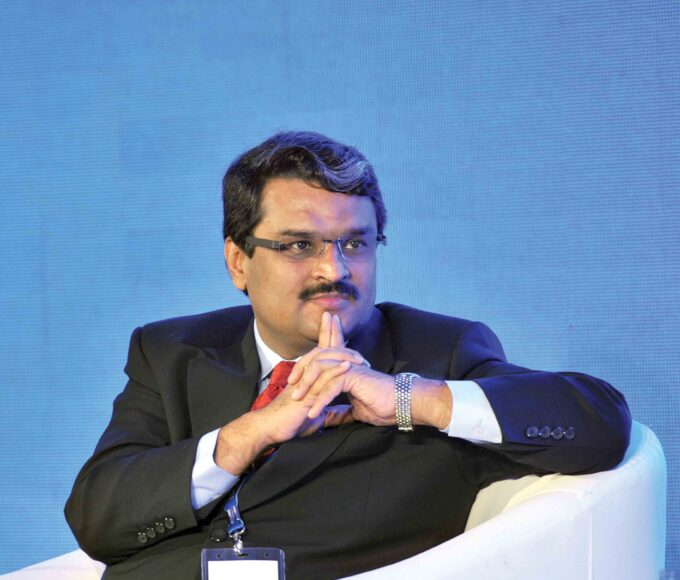- Cover Story
- Governance
- Globe Scan
- Corruption
- State Scan
- Talk Time
- Cover Story
- Governance
- Globe Scan
- Corruption
- State Scan
- Talk Time
Recent Posts
© Copyright 2007 - 2023 Gfiles India. All rights reserved powered by Creative Web INC.ScamJignesh’s ‘shady’ connections
The great gambler of the National Spot Exchange Ltd (NSEL), Jignesh Shah, is in jail. But when will the investors, who invested their hard-earned earnings in the NSEL, get their money back? It is in public domain now that Shah manipulated the trading and siphoned off investors’ money. gfiles exposed the scam in its June, September and November 2013 issues. Two top-ranking ministers were behind the scam, so nothing moved. But the moment the Lok Sabha elections were announced, law enforcing agencies arrested Shah. But, for the investors, Shah’s arrest has not come as any solace as they continue to run from pillar to post to get their money back. Neeraj Mahjan reports
Neeraj MahajanJune 6, 20146 Mins read1.3k Views
 Written by Neeraj Mahajan
Written by Neeraj MahajanMORE skeletons are expected to roll out in the Rs.5,600-crore NSEL scam. Even as Jignesh Shah, ShreekantJavalgekar and others cool their heels in Kalyan jail, the investigators are busy pinpointing the exact role played by Koshy Jacob and Sunil DagaKhairnar (ex-Director, NSEL) in managing the bureaucratic chain of command to control the ministries in Delhi on behalf of Shah.
With over 20 years of experience in agri-commodity trading, animal feed husbandry and consulting services, Khairnar is the owner of Indian Agri-business Systems Pvt Ltd, Indian Society of Agri-business Professionals, Indian Society of Healthcare Professionals and Rural Marketing Association of India (RMAI). Also, one of his companies is an Adviser to FTIL since 2007.
Curiously, Khairnar was also alleged to be involved in the cash-for-jobs scam in the railways. Hewas one of the three middlemen who were in touch with former Railway Minister Pawan Bansal’s nephew, Vijay Singla, and allegedly arranged as much as Rs.90 lakh through the hawala route as part payment of the Rs.10-crore bribe. Khairnar was also on the NSEL board from May-July 16, 2013, but moved out just before the exchangewent belly-up.
As Anjani Sinha says in his affidavit, “Sunil Khairnar, his close associate, who looks after liaison work for FTIL group in Delhi, was handling NSEL matter on daily basis. He was monitoring file movements, meeting Secretaries (both Rajeev Aggarwal and Pankaj Aggarwal and over 10 meetings in one year), other officials of the Consumer Affairs Ministry, honourable minister, and so on, on regular basis.”
This was further substantiated by a PwC audit on MCX, which found that the FT group and MCX paid Rs.17.76 crore to Khairnar. Though on paper these amounts were disguised as donations and professional charges, they seem to be a conduit for siphoning off money.
Of the above amount, MCX is understood to have diverted approximately Rs.12 crore to Khairnar after September 2012. The timing is very important as the Department of Consumer Affairs had issued a show cause notice to NSEL in April 2012, seeking an explanation why action should not be taken against it for violation of exemptions given at the time of granting the licence.
MCX paid Rs.11.85 crore as donations to the Indian Society of Agri-business Professionals and the Indian Society of Healthcare Professionals. Likewise, MCX is understood to have paid a rent of Rs.60 lakh per month for a warehouse in Taloja, Navi Mumbai, without any justification.
Quite a few organisations like the Arunodaya Charitable Trust and Vardhaman International, which received large sums of money in this manner from the MCX on one pretext or another, are allegedly bogus companies with no physical presence on the ground. There was also no documented policy in place for buying services from group firms and related parties. Some of the contracts of FTIL were not even discussedand approved by the exchange’s board of directors.
The MCX paid above Rs.700 crore for FTIL’s services–without a single quote from a global or Indian technology provider before awarding the contract to FTIL for software development. Similarly, MCX paid a mark-up of 32 per cent for procurement of hardware for 33 to 50 years term with provision for automatic renewal for another 33 years. All the four agreements signed with FTIL were not mentioned in the Red Herring Prospectus. Similarly, six agreements worth Rs.14.5 crore were signed with the NBHC without the approval of the board of directors.
This is probably the first scam of its kind in the world where 100 per cent of the fraud money is intact in the form of real estate and other assets. But the issue is how to differentiate between the legitimate wealth and illegitimate gains of the person in whose possession such moneyis found.ACCORDING to sources, “proceeds of such crime” and funds siphoned off from the stock exchange were channellised to make investments in real estate, hotels, luxury villas and resorts and money-laundering. A few companies, like Mohan India Pvt Ltd and its subsidiary units, acted as a conduit for laundered money which was routed to purchase high-end vehicles like Range Rovers and luxurious villas.
The modus operandi was that the Mohan India group would receive funds from NSEL, purportedly on account of sale of sugar, which would be transferred to various car dealers, developers and construction firms. Investigations reveal that Mohan India and others were receiving funds from NSEL for sugar which they had not delivered to NSEL at all. They would then invest these funds in real estate.
Mohan India alone is understood to have purchased a posh flat in Mumbai’s Borivali, plots in JorBagh, Sainik Farms, HauzKhas and Mehrauli in Delhi, eight plots in Karnal, Haryana, and flats in Gomti Enclave, Lucknow, besides a Toyota Fortuner, three Range Rovers and other assets.
What this means is that this is probably the first scam of its kind in the world where 100 per cent of the fraud money is intact in the form of real estate and other assets. But the issue is how to differentiate between the legitimate wealth and illegitimate gains of the person in whose possession such money is found. And how does that help the 11,000-odd investors running from pillar to post to get back their money?
“Time is very important if the money is to be recovered at all—sooner it is, the better chance there is of getting the money back. Delays can help the scamsters hide and spend the money,” explained a CBI officer specialising in economic offences. According to him, delay allows time for money laundering and makes it impossible to separate one scamvictim’s money from others’, or legitimate income from stolen income.
Tracking money is very expensive. If the money is still in the country, it may take time but the money can still be recovered. In case where money has been transferred abroad, chances of international repatriation are very rare and depend largely on the laws of the countries involved and the time elapsed. Another lacuna in Indian laws is that there is no provision for recovery and refund of the money to even the legitimate owners under the Prevention of Money Laundering Act (PMLA). PMLA primarily aims to identify, track, freeze and attach accounts, properties and assets.
Separate enquiries have also confirmed what gfiles reported in June 2013 about the existence of wash trade and manipulations to artificially inflate the trading volumes. The PwC forensic audit has corroborated the existence of 18,521 entries of wash trades, to the tune ofRs. 2,052 crore, on theMCX platform.SEPARATE enquiries have also confirmed what gfiles reported in June 2013 about the existence of the wash trade and manipulations to artificially inflate the trading volumes. The PwC forensic audit has corroborated the existence of 18,521 entries of wash trades, to the tune of Rs.2,052 crore, on the MCX platform. A few of those involved in such trading included Riddhi Siddhi Bullion and its group company, Supama, owned by bullion king Prithviraj Kothari, KarvyComtrade, Edelweiss Trading, Tradebulls, Vishwas Broking and Jindal Dyechem Industries. Even the FTIL-promoted Indian Bullion Market Association was heavily involved in wash trading on the exchange platform. The volume of wash trades executed by a member was as high as 98 per cent of the total trades in a particular contract. Prithviraj Kothari and Chhaganlal Thakkar of Tradebulls Commodities were allegedly the kings of the wash trade, which is usually carried out at the end of a financial year for tax evasion.

Meanwhile, all hopes of recovering the investors’ money is focused on Punjab where six of the biggest defaulting firms—Laxmi Overseas Industries Limited (LOIL) and its three subsidiary firms (LOIL Continental Foods, LOIL Health Foods and LOIL Overseas Foods), ARK Imports, White Water Foods, Namdhari Group, PD Agroprocessors and Yathuri Associates are based. Collectively, they owe Rs.1,524 crore to MCX.
LOIL, owned by rice king Balbir Singh Uppal and his son, Janak Raj Singh, who are alleged to be close to the ShiromaniAkali Dal, is the biggest defaulter—to the tune of Rs.720.30 crore. LOIL owns five flats in south Delhi, two shops in Naya Bazaar and an office on Kasturba Gandhi Marg in Delhi, besides a rice mill and a captive power plant at Khamano near Ludhiana on the national highway.
Political connections reportedly helped the Uppals get “heavy and out-of-turn” allotment of paddy for milling till 2010. But the group’s fortunes seem to have taken a u-turn in 2009-10, when the group got embroiled in litigation with the Punjab food agencies over payment of Rs.148 crore in lieu of the paddy allotted to it. Following this, the Punjab Food Supplies Department blacklisted LOIL for not paying the amount due to Markfed, Pungrain, Punsup, Punjab Warehouse Corporation and Punjab Agro.
Ironically, Uppal’s name was not mentioned in the FIR registered by the Mumbai Police in October 2013. The company is reportedly trying to get a stay on any kind of proceedings against it or its Directors till the case of its claim of Rs. 155 crore on the NSEL is settled.
Recent Posts
Related Articles
ScamJignesh ‘Unfit and Improper’
Written by Neeraj Mahajan CALL it an act of omission or commission, but...
ByNeeraj MahajanMay 5, 2019ScamDefaulters make merry
Written by Gfiles Editor Jab ishwar hai saath to dar kahe ka (When...
ByGfiles EditorMarch 4, 2015 - Governance
- Governance




























































